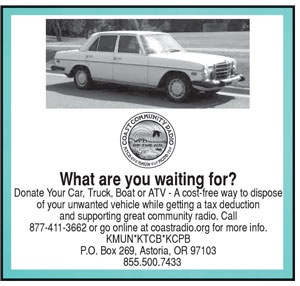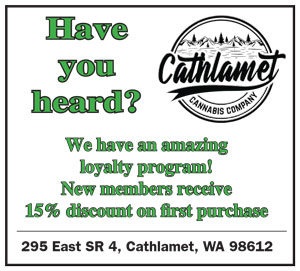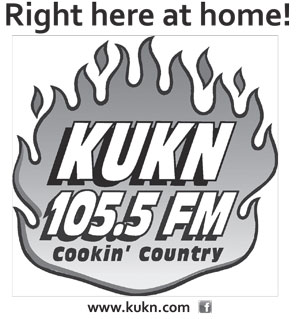New Skamokawa creamery turns out the cheese
May 29, 2014
Things are moving along at the Skamokawa Farmstead Creamery. Vicki Allenback and Kyleen Austin have their license now and have begun to sell cheese at the local farmer’s market, which had its opening day on Friday.
The dream began a couple years back, when Allenback was still looking to repurpose the fields that had gone fallow on her property just west of Skamokawa. She had begun to build a barn, but she didn’t have a plan.
“I’d wanted to do a dairy here for about a year and a half,” Allenback said. “I talked to several locals and nobody was interested.”
One day she asked Skamokawa resident and Columbia River Kayak owner Mark Whitaker if he had any ideas. He got really excited.
He knew somebody. That somebody was a talented musician and friend who worked in his office, Kyleen Austin. He emailed Austin that day. She was in California at the time but it wasn’t long before she and Allenback were communicating by email. They spoke on the phone once. Nothing had been decided.
Then one day out of the blue, Austin called Allenback to tell her about some goats that needed rescuing.
“I went to look at them and took them home,” Allenback said. And just like that the two were in business.
They finally met on December 28, 2013. Four months later they had a herd and milking and cheese making equipment. Initially, Austin just wanted to make cheese. She changed her mind and a partnership was formed.
“We’ve got major plans happening here,” Allenback said.
Allenback lived next door to and spent time with Dee Harley of Harley Farms for 17 years. Harley Farms is an artisanal goat cheese company in California. The world flashed small for a moment when it turned out that Harley had mentored Austin in the business.
“Dee was the one who told me to step off the curb and do this,” Austin said. “She was an inspiration to Vicki and me.”
Allenback had 17 years experience in animal husbandry, and Austin worked with goats and made cheese for 13 years.
“I had an artisan goat cheese company in California for about two years before I left,” Austin said. “Between the two of us, we have 30 years of collective knowledge in what I believe is the best of animal husbandry. That’s where it starts.”
Austin defined the best of animal husbandry thus: “The kids, from the time they are born are happy, healthy and getting all their needs met from physical to emotional and spiritual needs.”
She laughed, but she meant it.
“Animal husbandry is basically the care and feeding of animals,” she continued. “It is the human’s connection with the animal to ensure adequate nutrition with the right feed. It is providing good care. We trim their hooves every single month like clockwork, no matter how much of a pain it is and no matter how much they dislike it. Unfortunately, they don’t enjoy pedicures as much as I do.”
The seven goats they rescued have benefitted from this care since they have come to their new home. According to Austin, their owner had kept up their nutrition but because of physical limitations, had been unable to care for their hooves.

“We spent the last four months getting their hooves back to normal, or to normal for the first time,” Austin said. “One goat had hooves like genie shoes and her back hocks had completely dropped. It didn’t hurt her, but it really disabled her. She wasn’t able to move and her legs atrophied. It’s not good in this climate. You get microorganisms growing in there. She is doing much better.”
One of the goats walked by with a limp. Austin tried to approach but the animal hurried off. Allenback appeared and was soon with the goat, looking at her leg.
“Vicki is the goat whisperer,” Austin said.
They made two trips to Benton City to pick up more goats and now have 41. There are Alpines, Saanen, one Lamancha and one Toggenberg.
“The Lamancha breed has no ears,” Austin said. “Most of the does were bred to a Lamancha buck so they are going to have what I call Yoda ears. Little squishy Yoda ears.”
They socialize the animals as soon as possible by going out to play and interact with them. They plan to have an open farm, so families can spend time with the goats.
“Goat kids love human kids,” Austin said. “It’s great socialization for everybody and it gives young people a great first experience with goats. I can’t tell you how many adults I meet who have a bad opinion of these animals. One of our missions is to celebrate the goatness of the goat and help others to do the same.”
The socialization also allows the goat to get used to human contact, which will help when it comes time for milking or trimming hooves.
Vicki returned with one of the goat kids in her arms. He was completely happy there, resting his head against her shoulder.
“This is Sparky,” Austin said. “Sparky is my running buddy. He’s going to run a marathon with me sometime. ”
“He is magnificent,” she continued. “His confirmation is beautiful, he has nice long legs. He has good coloring with the shape of a heart on his back. And he’s completely chill when picked up. A normal goat will not hang like that. A normal goat will think: What are you doing? Put me down. I have stuff to do!”
“Sparky,” she said to the goat, “you are one lazy dude.”
They have a closed herd, which means there is no disease. They won’t bring in any new animals without serious testing. The original seven went through every single test that could be done, even though only two tests were required by the state. They will also be tested regularly for mastitis and “other things like that.”

The goats they bought in Benton City were also rigorously tested. According to Austin all the animals are healthy and disease free.
“This is our core stock,” Austin said. “We’ll breed or cull from this point on.”
Next season they will either rent a buck or rely on artificial insemination, and the following year they plan to acquire a buck of their own.
They only ask their goats to produce a minimum of a gallon each day.
“Economically, at a gallon a day per goat, it’s feasible to have a farmstead creamery that’s profitable,” Austin said. “Some dairies get two or three gallons from each of their goats, but the animal’s udders are hanging to the ground and their quality of life is not good.”
All of the Alpines are named after movie starlets. When a reporter shows up with a camera, even the most difficult goat races up to the milking stand for a snack. They know a photo opportunity when they see one.
The Saanen line have been given more esoteric names, according to Austin, names like Faith and Joy.
While Allenback has been working on construction and design, Austin has been spending the last few months trying to perfect her recipes. Because the climate is different than northern California where she last made her artisan goat cheese, she is doing a little adjusting.
“The air is different, the water is different, the soil is different,” she said. “It’s not hot, dry. I’ve had to play around to see how they work here. The chevre and feta do better here but I’ve had more moisture in the hard cheeses.”
She makes chevre, feta, and ricotta as well as several hard cheeses like Gouda and an Italian farmer’s cheese.
In addition to selling their cheese at the market, they’ve had some interest from chefs on the coast.
Allenback already plans to use her Harley Davidson to make deliveries.
“This is about fun,” Allenback said. “This isn’t about work. We’re having fun, we laugh a lot. We do a lot of crazy things and have a great time.”
She turned serious.
“The amazing part is that the community is behind us,” she said. “We’re putting a lot of people to work. I’ve been trying to figure out what to do with this property since I’ve lived here. We needed to bring people together in this community and give our kids a chance. We have some incredible people working with us and making this happen. We couldn’t do it without the people in our lives. It’s a beautiful thing.”
“It is bringing a lot of excitement to people who thought there wasn’t anything to get excited about,”
Austin agreed.
“And I love the goats,” Allenback said. “We couldn’t do it without them!”








Reader Comments(0)